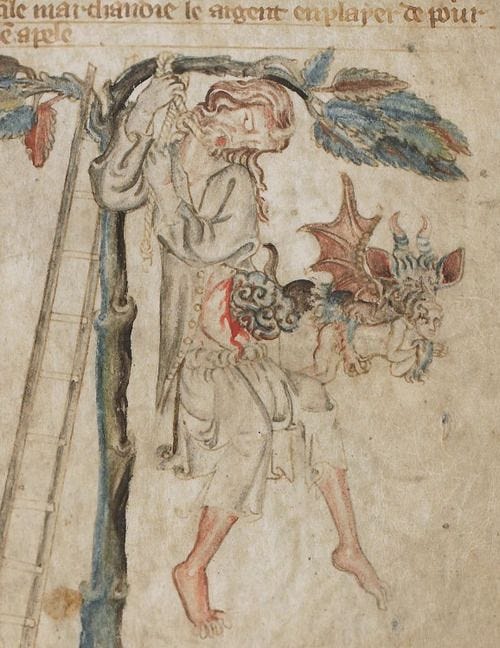(A note to readers: this instalment contains a very short scene—the two paragraphs after the illustration below—describing the sexual abuse of a minor. It is not particularly graphic but the content is necessarily awful and may be triggering.)
The Billionaire’s Tale
“Ted told me a story from his childhood,” Chris said. “I haven’t read his autobiography or seen all of his Ted Talks, but I’m pretty fucking sure he left this one out.” He leaned forward so far that he almost assumed a crouch. I thought he might be having a stomach cramp. “Do I believe what Ted told me? Do I believe it really happened? I’ll give you a two-part answer: yes, I believe it; and no, I don’t believe it, because if it’s true, then I’m in a lot of trouble.” Chris flipped the beer stein lid up and down a few times, as if it was a lighter that wouldn’t catch in a windstorm, then he pushed the stein to the other side of the table, staring at the kitschy mug with total loathing.
Chris was obviously not well. He’d suffered a terrible shock, so as I listened to his story, I began to rehearse my responses: Chris, you’re going to be okay; I’m glad you decided to speak to someone about it; we can get you help. I knew my role here, the Supportive Rational Friend, a part we’ve all been trained to play since our parents plopped us in front of the TV, where we learned that every problem in modern life can be ironed out with a good heart-to-heart chat. So I would hear Chris out, reassure him, recommend a therapist, and take my books and get out. I know how heartless that sound, but the heavy atmosphere was starting to choke the light from the room.
Chris sat up straight. He rested his hands on his knees, and in what seemed like a single sustained exhale, he half-spoke, half-chanted the following story from Ted’s childhood.
When he was six, Ted, an only child living in a middle-class neighbourhood in north Toronto, lost his maternal grandmother, a woman he described as a second mother, if not a first. One evening while Ted’s parents were at a bowling tournament, his grandmother died of heart failure while she was babysitting him. Ted found her body on the couch before his parents got home. According to Chris, Ted’s tone while relating what must have been a life-changing trauma was matter-of-fact: the story’s significance was yet to come.
With his grandmother gone, Ted was left in the care of neighbours for a few hours after school every day. Except for the family’s oldest son, a bully that terrorized the schoolyard, Ted had never met the family who took over his care for fifteen hours a week. In those days, he said, it was common to leave your children in the care of near-total strangers. Ted did not blame his parents for what happened.
The family were a Scottish couple with three children. The mother was a petit bourgeois housewife of the old school, fussy, vigilant, her house free of dust and other signs of uncleanliness. The living room, which the kids were not allowed to enter, was shag-carpeted and crammed with candy-coloured furniture sealed in plastic covers. The father was a medium-functioning alcoholic who worked in sales for a local retail chain, a dark presence in the household even when he was physically absent.
One day after an extended boozy client lunch, the father came home early. It was the first time the father had gotten home before dinner, and Ted noticed an immediate change in the children. They got very quiet. None of them would look at each other. They were all holed up in the family room when the dad came in, and when the father barged in on them he was so pissed Ted could smell him across the room. He was spoiling for a fight, but when he saw Ted the dad started horsing around and teasing the children. At that age, you don’t have the tools to judge the behaviour of other families, so when the kids joined in their father’s games, Ted went along with them, relieved to be included.
After some horseplay, the dad lined up the children, from youngest to oldest, and then he brushed their hair with a wire brush, pressing harder than Ted was used to. The man also cleaned the dirt and food smudges from the kids faces with spit and a hankie, taking especial care with Ted. He was a big man whose presence enveloped Ted like a cloak, and when he moved his face close he asked Ted about school and told the boy how sorry he was to hear about his grandmother. Then the dad asked Ted to join him in the living room, and he made a comically stunned face when Ted said he wasn’t allowed in there. I make the rules around here son, the dad said, and I can break them when I want.
I wanted to interrupt Chris here, to tell him that he didn’t need to keep going if he didn’t want to, the effort was clearly draining him, but he sensed my protective move and held it off by raising his hand to silence me. He didn’t pause the telling.
In the living room the dad closed the French doors, cloaking them in the late-afternoon gloom. He flipped open the stereo console lid and eased a record onto the spindle, always the same one Ted would learn: “Waterloo,” a country and western love ballad from the early honkey-tonk period. The dad sat in the plush arm chair, the only place to sit not covered in plastic, and he pulled Ted onto his lap. Ted remembered looking back at the parlour doors which opened onto the kitchen. The glass panels were frosted to an opaque sheen, and when a dark shape passed in the kitchen—likely the mom of the house—Ted imagined a shark swimming past by the galley window of a sunken ship. On the stereo, the song’s chorus chimed in: “Waterloo! Waterloo! Everybody has to meet his Waterloo.” Adam met his Waterloo in the Garden, the singer sang, and Napoleon on the battle field—“Where will you meet your Waterloo?” ran the refrain.
The man took out his cock and Ted met his Waterloo.
“That’s how he put it,” Chris said, finally interrupting the story. “He said, ‘The man took out his cock and I met my Waterloo.’ I couldn’t tell if I was supposed to laugh. I mean, why was he telling me this? He sounded like he was reading from prepared notes, like he’d gone over this in his head a thousand times, practicing the details. At the same time, I was certain he’d never told anyone this before.”
Ted said he couldn’t remember what the man did to him or what he was made to do to the man. “I wasn’t there,” Ted said. “I left my body as soon as the sick pervert exposed himself.” Reading Chris’s expression, Ted insisted he was telling the literal truth, that physically vacated his body and floated up to a corner of the living room, just under the ceiling, where he gazed down on the groping flushed man and the pail ventriloquist doll on his lap.
“When it was over, Ted returned to his body,” Chris said. “Re-entering the purely physical world is apparently like waking up from a month-long sleep. Nothing comes naturally—moving your limbs feels like having to speak a language you haven’t used in twenty years, and the normal rhythms of life, hunger and fatigue and needing to take a piss, are almost unbearable. Ted said the hangover period goes away in time, but you never escape what he called a feeling of total disgust upon re-entering own body.”
Ted was in such a daze that the man had to push him off his lap and shoo him into the kitchen. The molester’s children had gathered there, it seemed, to witness the new boy’s return from the underworld. The mother tended her pots and pans at the stove like a peasant wife in a faery tale, relieved that her children were getting a welcome break from their father’s attention. “I held my head high,” Ted insisted. “They thought their father had lowered me to their level. They thought I was one of them now. They couldn’t have been farther from the truth. I’d escaped their fate by an act of will.”
The abuse continued for almost three months, following the same pattern. The father came home early, he groomed the children, then he separated Ted from the pack and brought him to the dark living room, where, to the tune of “Waterloo,” Ted vacated his body while the man had his way with him. “I know what you’re thinking,” Ted said to Chris. “That the trauma of abuse forced me to dissociate from my own body, triggering a hallucination of disembodiment. I can assure you it’s not true. I did leave my body. New Age types and occultists call it astral projection or astral travel. That definition will suffice.”
The spirit, Ted explained, is comprised of fine matter, so fine that it is not bound to the same laws of time and space as the gross physical body. The spirit is a largely autonomous body encased inside a second body, and in the right circumstances can escape the bounds of its host. But that passage from the host body to the surrounding aether is difficult—imagine separating a handful of gold dust from a ten-gallon bucket of mud while the bucket is spinning at ninety miles an hour. The ability can be learned through great discipline or, in cases like Ted’s, induced by a sudden shock. Because children’s minds are not fully formed, they are more likely to experience astral travel in response to shock. Ted was soon so adept at astral travel that he could leave his body as soon as he sat in his abuser’s lap.
And then one dark winter afternoon, while Ted hovered in his corner of the ceiling, he realized that he was not alone. He thought that someone must have snuck into the room without making a sound, but the presence Ted detected was right next to him, only inches away from his astral body. The presence, Ted said, was not quite human, though it had a strong human-like personality, capable of rational thought and decision making. Not that Ted expressed his feelings that way; he told Chris that the presence reminded him of a school teacher, someone appointed to teach the child an important lesson, if Ted was willing to learn. Was Ted willing? He wanted to say yes, he was willing, but without a physical body he didn’t know how to put his thoughts into words.
You will learn, the presence told him, not in words that Ted could hear but in subtle vibrations, like music played on instruments crafted from the surrounding air. I shall teach you to speak without talking, to hear without ears, and to travel far beyond these walls. Are you willing?
Oh yes, Ted was willing. He didn’t know it until that moment, but he’d been waiting his whole young life for such an offer.
Part VI of The Heart of a Pig, “A Pig Heart,” will appear later this week. To read Part I, click here; to read Part II, here; Part III is here and Part IV is here. Keep the comments coming, and if you like the story, please share the joy on your social media channels.






Very good but creepy. I noticed one typo: "harder than Ted like".